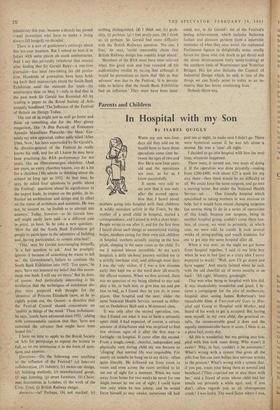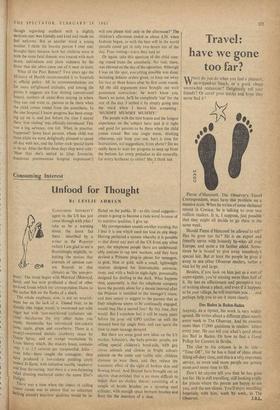Parents and Children
In Hospital with my Son
By ISABEL QUIGLY
WHEN my son was' four days old they told me he would have to have three operations some time be- tween the ages of two and five. He is now four years old and the operations are over, as far as I know successfully.
It seems very odd to me now that it was only after the second opera- tion that I heard about mbthers going into hospital with their children, A wildly mistaken article in the Times, by the mother of a small child in hospital, started a correspondence, and I joined in with a short letter. People wrote to me after it, and for the first time I heard about such things as' unrestricted visiting hours, mothers caring for their own sick children in hospital, mothers actually staying in the hos- pitals, sleeping in'the same room as the child. To me it seemed almost incredible. At my son's hospital, a daily six-hour journey entitled me to a strictly 'one-hour visit; and although most days I was the only visitor, if I was a few minutes early they kept me at the ward door till exactly the official moment. When we first arrived, there was no question of my being allowed to stay and play a bit, or bath him, or give him tea and put him to bed, as I found they let you do in some places. One hospital and the next, under the same National Health Service, seemed as differ- ent as Dotheboys Hall and a Montessori class.
It was only after the second operation, too, that I found out what it was to have a seriously upset child. I had expected, of course, a certain amount of disturbance and was surprised to find few obvious signs of it after the first stay—a fortnight—in hospital. It came after the second. From a tough, rowdy, cheerful, independent and physically very daring child my son became so 'clinging' that normal life was• impossible. For nearly six months he hung on to my skirts—often quite literally. He followed me from room, to room and even across the room terrified to let me out of sight for a moment. When we went away from home for two weeks he never for one single instant let me out of sight; I could leave him only when he was asleep, and he would force himself to stay awake, sometimes till half past ten at night, to make sure I didn't go. There were hysterical scenes if he was left alone a second. He was a 'case' all right.
I decided to go into hospital with him the next' time, whatever happened.
There were, it turned out, two ways of doing it. If the operation was done privately—costing from £2004400, with about £25 a week for my stay there—then there would be no difficulty at all. We could keep the same surgeon, and go into a nursing home. But under the National Health Service—ah. . . . One friendly hospital which specialised in taking mothers in was anxious to help, but it would have meant changing surgeons (an unwise thing to do in a series of operations of this kind), because our surgeon, being in another hospital group, couldn't come there (un- less, of course, we went in privately, in which case, we were told, he could). It took several weeks of string-pulling and much kindness for me to get into the same hospital after all.
When it was over, on the night we got home from hospital together, I said to' my little boy when he was in bed (just as a crazy idea I never expected to work): 'Well, now 1'11 go down and have supper.' And nearly fainted when he said, with the old cheerful air of seven months or so back: 'All right, Mummy, goodnight.'
That was what being in hospital with him did. It . was incalculably wonderful and good. I be- came a campaigner for the idea of mothers-in- hospital after seeing James Robertson's two remarkable films A Two-year-old Goes to Hos- pital and Going to Hospital with Mother, and heard of his work to get it accepted. But having seen myself, in my own child, the practical re- sults, the immeasurable good it does and the equally immeasurable.harm it saves, I bless it, as a plain fact, every day.
All this is wonderful; but my getting into hos- pital with him took some doing. Why wasn't it easier? Why, in fact, couldn't it be automatic? What's wrong with a system that gives all the pills free but can turn babies into nervous wrecks in the process? What's wrong with a system that, if you pay, treats your being there as normal and beneficial (They expected me to stay there with her,' said a friend of mine whose child had her tonsils out privately a while ago), and, if you don't, often regards you as an obstreperous crank? 1 was lucky. The ward Sister where 1 was, though regarding mothers with a slightly sardonic eye, was friendly and kind and made me feel welcome. But in another ward a young mother. I think the bravest person I ever met, brought there because both her children were in with the same fatal disease, was treated with such scorn, unkindness and plain rudeness by the Sister that she often came out of it near to tears.
What of the Platt Report? Two years ago the Ministry of Health recommended it to hospitals as official policy. All its recommendations are for more enlightened attitudes, and among the points it suggests are free visiting (unrestricted hours), mothers of under-fives staying in where they can and want to, parents to be there when the child comes round from the anesthetic. In the one hospital I know progress has been creep- ing up on it, and just before the time I stayed there 'free visiting' was officially introduced. This was a big advance, one felt. What., in practice, happened? Sonic local parents, whose child was there while we were, delightedly, planned to spend all day with her, and the father took special leave to do so. After the first three days they were told: 'Now that she's settled in [that favourite, disastrous portmanteau hospital expression!] will you please visit only in the afternoon?' The children's afternoon ended at about 4.30, when bedtime began, so with the best will in the world parents could get in only two hours out of the day. Free visiting—when they said so.
Or again. take this question of the child com- ing round from the anzesthetic. No visit, there, was allowed on.the day of the operation. Although I was on the spot, everything possible was done, including definite orders given, to keep me away for two or three hours after he first came round. All the old arguments were brought out with passionate conviction: he won't know you, there's no point, he'll be completely 'out' for the rest of the day, I settled it by simply going into the ward when I heard him screaming: 'MUMMY MUMMY MUMMY.'
The people with the best brains and the longest experience on the subject have said it is right and good for parents to be there when the child comes round. But one single nurse, thinking otherwise, can keep you out. Isn't it time for instructions, not suggestions, from above? Do we really have to wait for progress to seep up from the bottom, for every prejudice to die naturally, for every battleaxe to retire? Me, I think not.







































 Previous page
Previous page